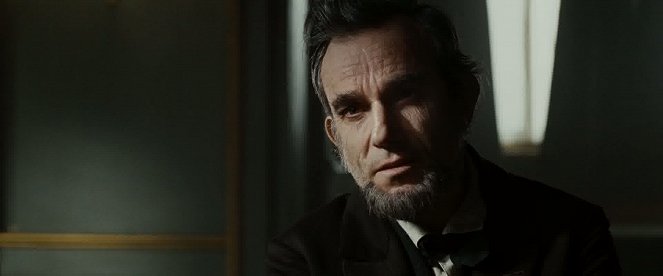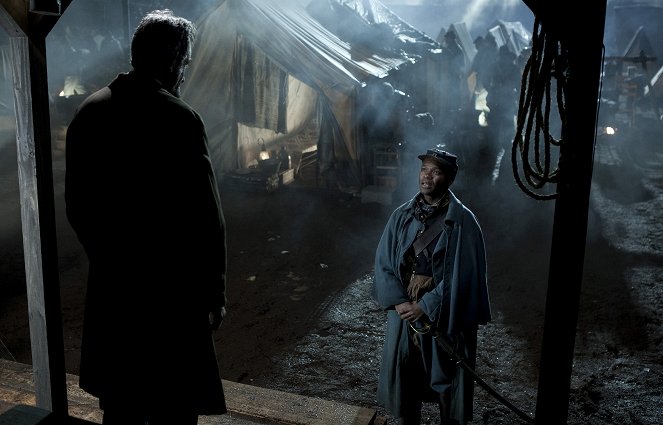Directed by:
Steven SpielbergScreenplay:
Tony KushnerCinematography:
Janusz KaminskiComposer:
John WilliamsCast:
Daniel Day-Lewis, Sally Field, Joseph Gordon-Levitt, Tommy Lee Jones, John Hawkes, Hal Holbrook, James Spader, Tim Blake Nelson, Bruce McGill, Joseph Cross (more)VOD (3)
Plots(1)
A revealing drama that focuses on the 16th President's tumultuous final months in office. In a nation divided by war and the strong winds of change, Lincoln pursues a course of action designed to end the war, unite the country and abolish slavery. With the moral courage and fierce determination to succeed, his choices during this critical moment will change the fate of generations to come. (20th Century Fox UK)
(more)Videos (56)
Reviews (14)
People will expect from this movie whatever they will. It was made by Spielberg, so in this respect there is nothing wrong with it, more or less. Daniel Day-Lewis in turn trained god knows how many years for this character. Everybody keeps saying that he articulates like Abraham, but nobody has really seen him alive. But yeah, I get it. But I’d say that such a movie only makes sense for the USA. Over here, it’s average at best and it’s impossible to have any deep emotions about it. Quite the contrary. I only watched it because of Spielberg and it was a waste of time.
()
Griffith, Ford, Spielberg. Lincoln. Three great American directors and their respective versions of the Lincoln myth. Though Spielberg takes an honest and respectful approach to Lincoln’s personality, creating a cult and idealising a democratic idea is not as important to him as drawing the viewer into the narrative. Above all, this is a riveting political drama, with Abraham Lincoln as the protagonist. It is fascinating to watch how smoothly one of Spielberg’s least action-oriented and least epic films moves forward, how the individual scenes are knitted together, how the director works with the deadline (to get 20 votes by the end of January), how the personal storyline serves the work storyline. The film does not primarily set out to depict Lincoln as a messianic figure demonstrating helpfulness toward all human beings without distinction, and such deification, if it happens, never overshadows the central goal of pushing through the Thirteenth Amendment before the end of the Civil War. We may even have doubts about the “purity” of Lincoln’s relentless pursuit of justice in the face of the law – we are not led to adopt a clear position as actively as in Spielberg’s other socio-political films, e.g. through impassioned music. Furthermore, the narrative is slowed the most by Lincoln’s “Christ-like” tendency to sit down in front of a group of listeners and start telling them a story. Does this really prove to us that Lincoln is the father of the American nation, who could take the liberty of making jokes about George Washington, or have we entered the realm of political satire about an elderly gentleman who liked to talk at times when it was necessary to act? The father interpretation would clearly be more appropriate also for the repeated adoption of the younger son’s childish perspective (including a very clever narrative feint in the climax), but to me it particularly involved the highlighting of the lack of didacticism in Spielberg’s approach. With the flawlessly cast actors and very impressive images (the meaning-making lighting and placement of the characters, frontal shooting, when there is a reason for every movement), With Lincoln, Spielberg primarily constructed an intelligent drama that ceaselessly keeps us on our toes and requires constant linking of contexts. And only then did he create a myth. 90%
()
I love how different every Steven Spielberg film has been in recent years. How each time he tries a slightly different approach, a different genre, and works with different actors to get it right every time. Like now. For the record, I consider Amistad to be one of Spielberg's best films ever, which made me all the more eager to see how he would deal with slavery this time around. Almost as good (i.e., Amistad is better after all). To make a two and a half hour long film in which there is only talking and dozens of historical characters pass through obviously bothers some people. I don't understand why. A lot of so-called reviewers grumble that the film is a messy, chatty stew that was made just to win an Oscar(s). And most importantly, "there are no battles - even in War Horse there were more". Oh, my God, people! Lincoln is great precisely because there are no battles. We know that the Civil War is raging, we can imagine what a tragedy it is thanks to the opening scene, but why should we continue to watch it? Isn't it enough to watch what it does to people? I think absolutely. The relentless pursuit of the 13th Amendment is a hundred times more thrilling than scenes of a battlefield where cannons tear people apart. And that effort is well described - as is President Lincoln. A sensible and stubbornly opinionated man who has his quirks, his ailments, but also a sense of humor, a perpetual storyteller and (the nicest surprise for me) a thoroughly skilled schemer. The characters, of which there are definitely not as many as many people claim, can be beautifully understood thanks to their performances, the individual stories into which the whole plot is divided are excellent and especially well ended (the last scene of Tommy Lee Jones!). There's not much to say about the actors, Steven Spielberg doesn't pick bad ones... I just wonder why Liam Neeson turned down the role when he's certainly not too old to be the Lincoln we see here. But Daniel Day-Lewis is... Wow! Amazing! So now it's just classic praise for Kaminski's stunning cinematography, which once again plays with light and shadow and looks great in the movie theatre, and of course Williams' music (it doesn't stand out in the film as much as it does on the separate soundtrack, but it's still divine). Five pure stars.
()
So what, guys, shall we abolish slavery? Yay or Nay? Lincoln watches broodingly. The lawmakers negotiate. Lincoln speaks broodingly. The lawmakers debate. Lincoln remains broodingly silent. The lawmakers argue. Lincoln dictates a letter, broodingly. The lawmakers vote. Lincoln broodingly leaves the room. The lawmakers celebrate. Lincoln dies, this time without a sign of broodiness. I’ll say this, for the target audience of historical conversational biopics (the film shows a battlefield only once, and right at the beginning), this film about the famous American president and the process of approval of the 13th constitutional amendment will probably be perfect. Spielberg is a master of his craft, Daniel Day-Lewis is a master of his art, and both of them show it. But honestly, who among us (with the exception perhaps of art scholars) can be interested in this? In short, a likely bland Oscar winner that I will not like. But I have to give it to it that it never pissed me off the way Spielberg’s previous film did. PS: And I looked forward all the time at least to the assassination… but nothing. PS2: Steven, please, do Robocalypse next.
()
Not enough of Janusz Kamiński’s impressive exterior shots (two, to be exact: Joseph Gordon-Levitt watching body parts being covered with soil and the pair sitting on the porch). Too few emotional scenes in which John Williams could show off. Too few
relationship storylines that would increase interest in the characters and their fates. Too little of anything that would
intrigue viewers who are not interested in these particular historical events. Elegantly filmed and well-played interior
history tedium. Daniel Day-Lewis is excellent as always.
()



Ads